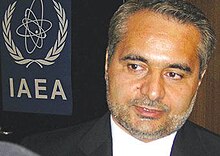Hossein Mousavian
Appearance
Hossein Mousavian (Persian: سید حسین موسویان, born 1957 in Kashan) is a former Iranian chief nuclear negotiator, author and has been a Middle East Security and Nuclear Policy Specialist at at Princeton since 2009.

| This article about a political figure is a stub. You can help out with Wikiquote by expanding it! |
Quotes
[edit]- Trump’s decision undoes the signature foreign policy achievement of his predecessor, Barack Obama, and represents an affront to the United States’ European allies, which had strongly lobbied the Trump administration to remain in the deal. But the more enduring impact will be in Tehran, where Trump’s nixing of the JCPOA—and Europe’s response—will push Iran’s leaders to... seek to strengthen its ties with non-Western powers, including China and Russia.
- For the past six decades, the United States has been the region’s hegemonic power. However, Trump’s unilateralist approach and the future of JCPOA may change the calculation by creating a rift among the transatlantic allies, and bringing the eastern bloc powers, Europe and regional powers such as Iran, Turkey and Iraq, closer together [and along with other factors] has the potential to transform international power politics, shifting from an American-led system to a multi-polar world
- If the United States is serious about its war on terrorism, it needs to stop politicizing security and draw on past experiences. If it does so, it’ll realize that Iran is the indispensable partner in the fight against terrorism—if the eradication of terrorism is, indeed, what the United States wants.
- Sustainable peace and security require good bilateral relations and regional cooperation between Tehran and Riyadh. Iran and Saudi Arabia have significant differences, but they share common interests in many critical issues, such as energy security, nuclear nonproliferation, and Middle East stability.
- The Iran nuclear deal is the most comprehensive agreement in the history of non-proliferation. As part of it, Iran accepted the most intrusive transparency measures and stringent limits on a nuclear programme ever demanded of a non-proliferation treaty member... where Iran has kept its end of the bargain, it has been rewarded with sanctions and additional pressure, and the benefits Iran was supposed to receive have been suddenly snatched away.
- From the Iranian point of view, the deal now is a lose-lose because the Americans are rewarding Iran with more sanctions as Iran is cooperating or has cooperated for two years with the IAEA - International Atomic Energy Agency - to fully comply with every commitment that's in the deal... Europeans failed. Americans violated. Even Chinese and Russians - they did not fully comply with their commitments... John Bolton, Secretary Pompeo, Mohammed bin Salman, the crown prince of Saudi Arabia, Bibi Netanyahu - they are fully allied to fight with Iran regardless of Iranian goodwill to implement the maximum level of transparency to the nuclear deal.
- All Things Considered NPR (7 July 2019)
- Over the past two years,the UN’s nuclear watchdog, the International Atomic Energy Agency (IAEA), issued 15 reports confirming Iran’s full compliance with the terms and conditions of the JCPOA. What did the United States do in return? Not only it did not fulfill its commitments tolift nuclear related sanctions and facilitate normal business with Iran but it withdrew fromthe deal and rewarded Iran’s goodwill by imposing stringent new economic sanctions and unleashing a torrent of hostile rhetoric.
- In this manner, the United States responded to Iran’s flexibility and cooperation with a “maximum pressure” campaign: U.S. sanctions on Iran are more comprehensive even than those on North Korea, which withdrew from theNuclear Nonproliferation Treaty (NPT) in 2003. To the grave disappointment of the Iranian people and government, Europe has proved too inept and spineless to mitigate the effect of U.S. withdrawal by honoring its commitments under the JCPOA.
- In Iran, there is a pervasive belief that the West is in decline and that U.S. hegemony in the Middle East is over. This belief has gained credence as an array of Western intellectuals and leaders have acknowledged such a decline. Iranians note that the United States has failed in almost every conflict it initiated since the Second World War.
- Given the impasse between Iran and the United States, the most immediate and realistic step toward reducing tensions in the Middle East would be to set aside the idea of negotiations between the two countries for now and instead focus on facilitating direct negotiations between Iran and Saudi Arabia to discuss, among other things, putting an end to the devastating war in Yemen.
- Countries like the United States prefer to sell to these oil-rich countries hundreds of billions of dollars of arms, so they want to maintain the status quo. President Trump, you remember, signed $300-400 billion in arms to the Saudis. Trump and his officials don’t care whether these weapons are used against Yemenis. They have a short-sighted vision. If the United States would have invested in a regional cooperation system to bring peace and stability, then all Middle Eastern countries would have good relations with Europe and the United States...We should work for and be convinced of security for everyone. This is the principle we should invest in... The United States has lost every war it has fought since the Second World War.
Quotes about
[edit]- He supports the Treaty on the Non-Proliferation of Nuclear Weapons (NPT) as well as an Islamic fatwa against nuclear weapons. Yet, given zero achievement of adherence to NPT over the past fifty years, Mousavian believes that only when Muslim-majority powers’ (such as Egypt, Iran, Turkey, and Saudi Arabia) pursue weaponization and the nuclear bomb will Israel and the United States come to the table and negotiate in good faith an end to all WMDs in the Middle East.

